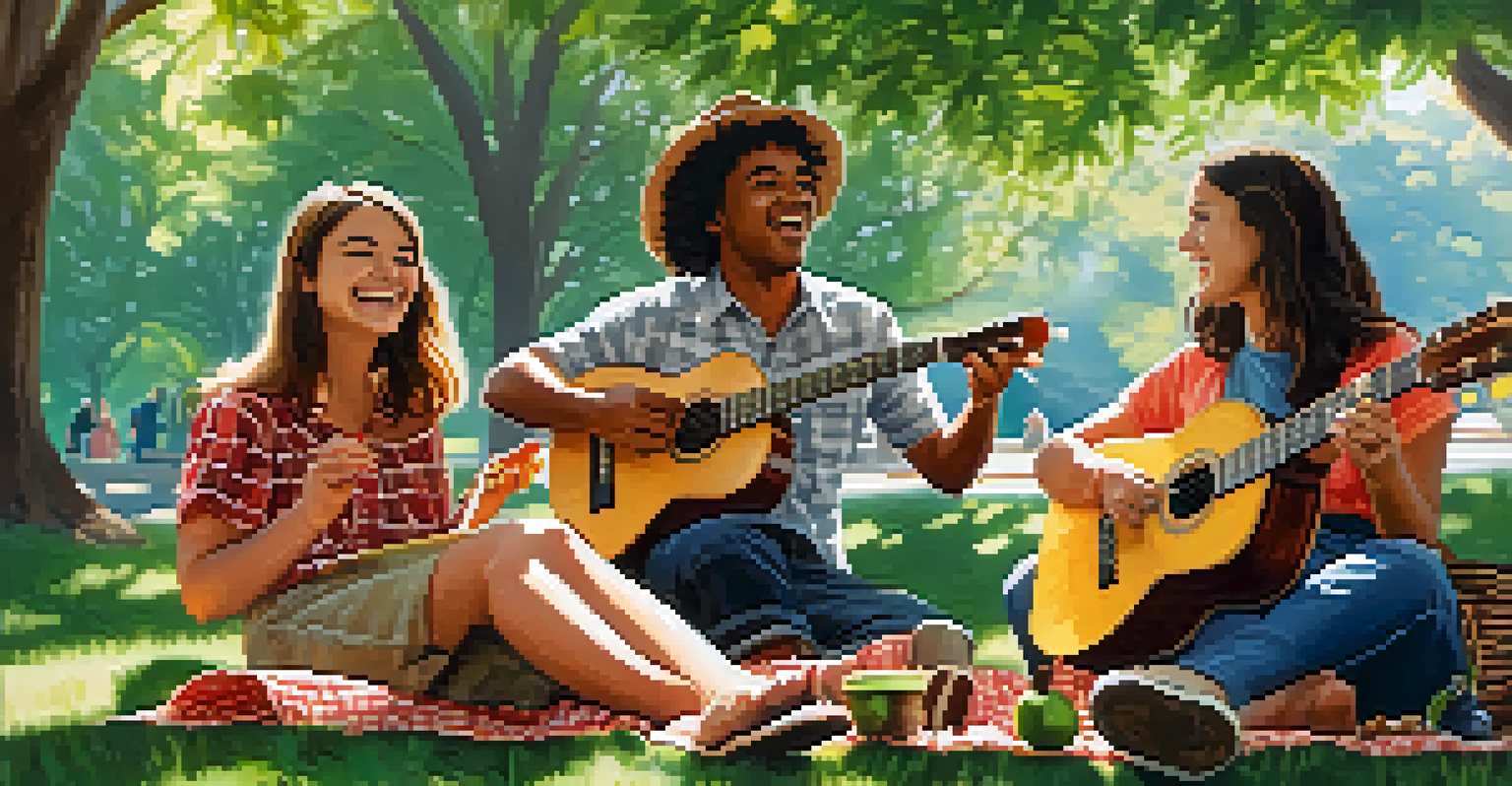Developing Social Skills Through Group Ukulele Lessons

The Power of Music in Social Interaction
Music has a unique ability to bring people together, creating a sense of community. When individuals come together to learn an instrument, like the ukulele, they share a common goal that fosters collaboration. This shared experience is foundational for building social skills, as it encourages communication and teamwork.
Music can change the world because it can change people.
Imagine a group of strangers, each holding a ukulele, learning to strum their first chords together. The laughter and shared struggles break down barriers, allowing participants to connect on a personal level. This connection often leads to friendships that extend beyond the lessons, proving that music is indeed a universal language.
As learners progress, the group dynamic evolves, promoting trust and support. With each new song, they not only develop musical skills but also learn to rely on one another, enhancing their social interactions and boosting their confidence in group settings.
Creating a Safe Learning Environment
A key aspect of group ukulele lessons is the nurturing environment they provide. Instructors often foster a space where mistakes are welcomed and learning is celebrated, reducing the fear of judgment. This atmosphere encourages participants to express themselves freely, which is crucial for developing social skills.

When individuals feel safe to share their thoughts or ask questions, they practice essential communication skills. They learn to articulate their feelings and opinions, which is a vital component of social interaction. This safe space also allows participants to support one another, reinforcing the idea that everyone is on a similar journey.
Music Fosters Social Connections
Group ukulele lessons create a sense of community, allowing participants to build friendships through shared musical experiences.
Over time, this supportive environment cultivates empathy, as learners begin to understand and appreciate the challenges others face. As they cheer each other on, they strengthen their ability to connect with others, an essential skill in both personal and professional relationships.
Teamwork and Collaboration Through Music
Group ukulele lessons naturally encourage teamwork, as participants often play together in harmony. This collaborative effort requires individuals to listen to one another, synchronize their playing, and blend their sounds. Such activities teach important social skills, including cooperation and active listening.
The only thing better than singing is more singing.
When learners work together to create music, they experience the joy of shared success. For instance, when the class finally plays a song together flawlessly, the collective achievement fosters a sense of belonging. This feeling can be incredibly empowering, reinforcing the value of teamwork and collaboration.
Moreover, collaboration in music often translates to other areas of life. Participants learn that by working together, they can achieve more than they could alone, which is a lesson that resonates in both social situations and workplace environments.
Building Confidence Through Performance
Performing in front of peers can be a daunting experience, but group ukulele lessons often include opportunities for students to share their progress. These performances, whether informal or structured, help individuals build confidence in their abilities. The support from fellow learners during these moments creates a positive reinforcement loop.
For many, stepping onto a stage or simply playing for the group can be a transformative experience. It allows participants to confront their fears and grow, teaching them that vulnerability can lead to connection. The applause and encouragement from classmates can significantly boost self-esteem and social comfort.
Safe Spaces Boost Confidence
A nurturing learning environment encourages individuals to express themselves, enhancing their social skills and self-esteem.
As learners become more confident performers, they also become more comfortable in social settings. This newfound assurance can extend beyond the ukulele lessons, impacting their interactions in various aspects of life, from casual gatherings to professional presentations.
Developing Communication Skills through Group Interaction
Group ukulele lessons require participants to communicate effectively, whether through verbal cues or non-verbal signals. As students learn to play together, they develop the ability to express themselves clearly and understand others' cues, which are vital components of social skills. This practice in a musical context translates well to everyday interactions.
For example, discussing which song to learn next or helping a peer with a difficult chord fosters dialogue. Such conversations encourage learners to articulate their ideas and be receptive to feedback, honing their communication abilities. This back-and-forth exchange mirrors real-life conversations, making it a valuable practice ground.
Furthermore, the collaborative nature of group lessons encourages individuals to engage in constructive criticism. Learning how to give and receive feedback is an essential social skill that enhances relationships and promotes effective teamwork in other areas of life.
Fostering Lasting Friendships Through Shared Interests
One of the most rewarding outcomes of group ukulele lessons is the friendships that blossom among participants. Sharing the experience of learning and making music together creates bonds that can lead to lasting relationships. These connections often extend beyond the classroom, with classmates meeting up to practice or attend performances together.
As friendships develop, individuals find a support system that enhances their social lives. They encourage one another not just in music, but in personal pursuits as well, creating a network of support. This sense of community is invaluable, especially for those who may struggle to connect with others outside of structured environments.
Teamwork Enhances Communication Skills
Collaborative music-making teaches essential social skills like cooperation and active listening, which translate to everyday interactions.
Moreover, engaging in group activities like ukulele lessons provides a platform for participants to explore shared interests. This common ground often serves as a catalyst for deeper conversations and connections, reinforcing the idea that pursuing passions together can lead to meaningful friendships.
Conclusion: The Social Benefits of Group Ukulele Lessons
In summary, group ukulele lessons offer a unique and enjoyable way to develop social skills. Through music, individuals learn to communicate, collaborate, and build confidence in a safe and supportive environment. The friendships formed in these settings can enrich lives and provide a sense of belonging.
As participants strum their ukuleles together, they not only create beautiful music but also cultivate essential social skills that will benefit them in various aspects of life. The lessons learned in a group setting extend far beyond the notes on the page, impacting personal relationships and professional interactions alike.

Ultimately, group ukulele lessons exemplify how engaging in a shared activity can lead to personal growth and community building. So, whether you're a seasoned musician or a complete beginner, picking up a ukulele in a group setting might just be the key to unlocking new social opportunities.